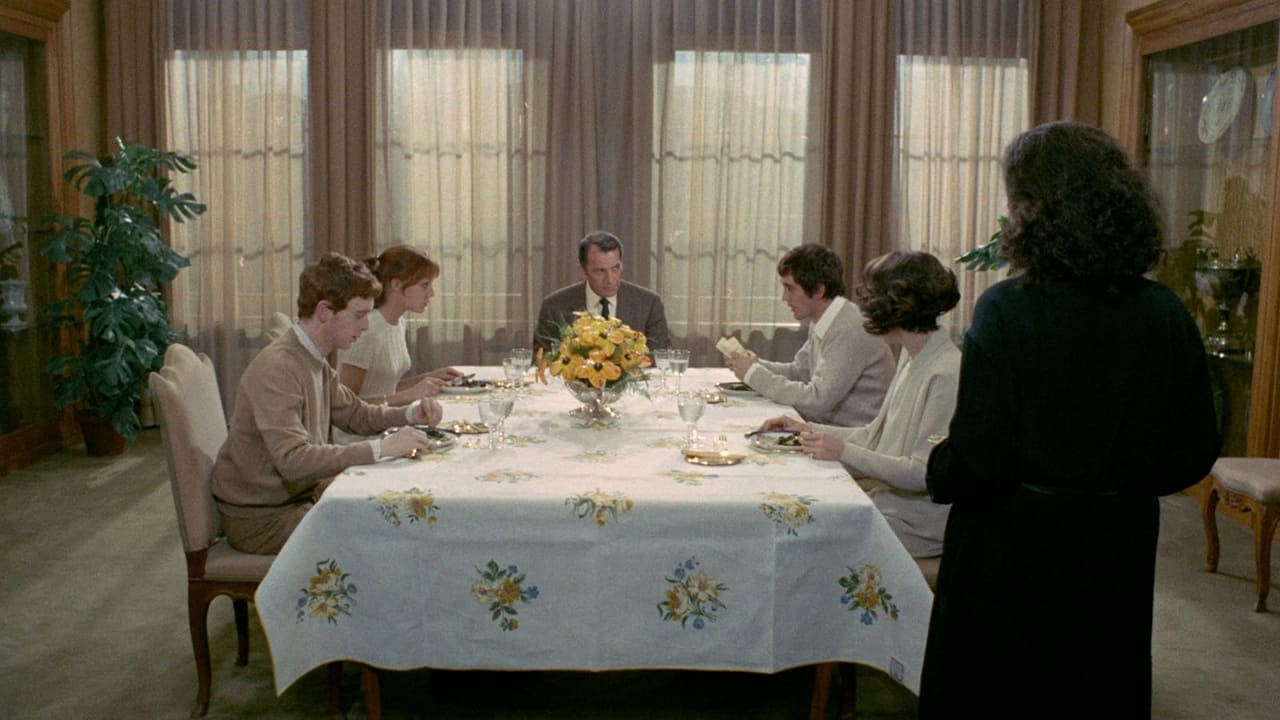

The Worst Film Ever
... View MoreGood films always raise compelling questions, whether the format is fiction or documentary fact.
... View MoreThis is ultimately a movie about the very bad things that can happen when we don't address our unease, when we just try to brush it off, whether that's to fit in or to preserve our self-image.
... View MoreThere are moments in this movie where the great movie it could've been peek out... They're fleeting, here, but they're worth savoring, and they happen often enough to make it worth your while.
... View MoreOnly Pasolini could've filmed something of this kind. No-one else is this crazy. Almost fifty years after its release, the interpretation of the film has been almost settled: the visitor is God or some other superhuman entity, the obsession the family members develop is the taste of the unknown and their final mental breakdown is the inability of the bourgeois to live authentic feelings and to break their own limits. Supporting this interpretation is Emilia's fate, who unlike her masters goes back to her birthplace and is changed in better, almost to a God-like state.Sure, this film is not for everyone, least of all for people who know nothing about the context of Pasolini's beliefs and Italian society. But when you get them, you see a masterpiece of artistry, which is so much so that it loses itself in its mystery and gives little to the watcher to take home. What I mean is that, like many successful attempts at genius, "Teorema" lacks any emotional response by its viewers and any response at all by non intellectuals. It is regardless a milestone in Italian cinema and an incredible showcase of dream-like artistry.
... View MoreRanks alongside his "Gospel According to St Mathew." I saw several metaphorical links in "Theorem" to Fellini's "Nights of Cabiria," a film scripted by Pasolini; the contribution of Pasolini to the lovely Fellini film is often overlooked.The allusion to the Terrence Stamp character as Christ is not difficult to pick up. The political context is also more than obvious. "Theorem" encapsulates all of Pasolini's genius evident elsewhere, in one work.Here's a Pier Paolo Pasolini film that's different--he uses good looking established actors unlike his other works where he would pick actors unknown and less attractive. In "Theorem" the good looking characters are contrasted with the ugly, non-professional actors intentionally.The film might appear overtly to be about sex but Pasolini's canvas captures a lot more than the obvious. Brilliant casting. Mozart's "Requiem" rendered by the Russian Academy Choir is transcendental. Morricone's use of wind instruments is so different here but captures the mood of loneliness. Terrence Stamp is the eye candy of the film, just as he was in "Far from the Madding Crowd". All three ladies: Sylvano Mangano, Laura Betti and former Mrs Jean Luc Godard (Ann Wiazemsky) give more than interesting performances--each body movement tells you so much. Words are rarely required to communicate in "Theorem"; visuals and music do more in that department.
... View MorePasolini has created a more serious and complex version of the 1930's classic "Boudu Saved From Drowning" in which a mysterious figure descends on a household of bourgeois people in Milan, a household whose members struggle with all sorts of psychological and religious issues. In this case we have no idea who the mystery person is, indeed the family just seem to accept him. Over the course of the film the stranger manages to have sexual and loving relationships with everyone from the maid to the father of the household. The young son struggling with homosexuality, the maid caught up in a virginal religious state, a besotted young teen daughter, the mother with unfulfilled sexuality and the father struggling with his bourgeois attitudes to human capital and homophobia. The stranger disappears as mysteriously as he arrived and the family goes into a perverse decline, other than the son who becomes an artist influenced by Francis Bacon, the English artist who represented many homosexual images of his own relationships in his striking art (as seen in a book featured in the movie). Each member seems to have been touched by some strange religious experience, left to come to terms with their perversions and fears. The film is often seen as representing the trans-formative act of religion with some being touched by the hand of god and others continuing their worst attitudes and behaviour. The father leaves his factory to his workers, the teen goes into a catatonic state, the maid becomes a healer and mystic destined for an unusual death, the son a talented artist and the mother increasingly and uncontrollably lustful despite constant religious images impinging on her senses. The father symbolically casts off all bourgeois elements by stripping naked in public. Video references keep crossing to some strange desert landscape, whose meaning only becomes apparent at the end like some scene from hell. What is often ignored is the camera-work which is often tracking across the top of many scenes almost as if it is searching for some truth. Really an amazing movie requiring a lot of work and thought from the viewer.
... View MoreThis is great, but I'm not sure if for the reasons usually cited.Yes, there is a fable here, a mysterious man upsets balances in a bourgeois household. Yes, it is from those times -Bunueltimes, Godardtimes- when the word 'bourgeois' was meant quite vehemently. It is symbolically abstruse throughout about empty lives and the quest for meaning.But, I think as with these people depicted on desperate journeys to fulfillment, the more you cling to the search for meaning as a viewer and try to boil it down to something that makes sense, the more you end up with just an allegory about the failure to do it. For all I know, that was Pasolini's intention, echoed loudly in the parting cry for god in the wilderness.No matter. Me and him mean wholly different things by emptiness. What captivates me here is the free form of the narrative, the cinematic eye that places you as transparent observer in the same world as these people, not easy to accomplish this at all, and the journey through cracks of story to the wondrous emptiness of everything (trees, sunlight, concrete, people) languidly floating in space together.It is in the same direction as Antonioni, though hampered by allegory. It invigorates the senses like he does. And the eye is tuned to the same architecture of empty space as seen in L'Eclisse and Blowup.Pasolini may have meant this as lament or indictment. I get the same melancholy joy as from Japanese woodblocks.
... View More